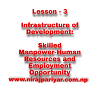.png) |
| Class 10 Social Unit 5 Lesson 2 Executive |
Lesson -2
Unit 5 civic awareness
Executive
A. Short answer questions
1. Write the differences between the federal executive and provincial executive.
Ans:- the differences between federal executive and provincial service executive are listed below:
Federal executive
- The only one federal government is federal executive.
- President, vice president and council of minister remains under it.
- It supports for the provincial activities and gives necessary direction.
- Central executive power is vested in federal executive.
Provincial executive
- The executive of each province is provincial executive.
- The head of the province or chief minister and other minister remain under it.
- It gives directions to rural municipality and municipality and supports for their functions.
- Central executive power is vested in federal executive.
- Executive power of provinces vested in provincial executive.
2. Mention the function of executive.
Ans:- The functions of executive are as follows:
i. It implement the laws passed by legislative.
ii. It performs all the administrative functions.
aises taxes and spins them according to the approval of legislature.
iv. It prepares ordinances and issues when the session of parliament is not going on.
v. It prepares the annual budget and carries out after passed by legislature.
3. How can you help the government personally? Write in points.
Ans:- I can help the government personally in the following ways:
i. By paying tax on time.
ii. By taking part in different development works.
iii. By providing constructive suggestions regarding various subjects and national issues.
iv. By following the laws, rules and regulation of the country.
v. By participating in various elections.
4. What plan would you make to develop Nepal if you became the prime minister?
Ans:- If I become the prime minister of Nepal, I would make the following plan:
i. Modernization agriculture by introducing various technologies.
ii. Create employment opportunity by developing industries.
iii. Make the provision to provide the education and skills training in rural areas of Nepal in free of cost.
iv. Conduct many small and medium hydro power projects and encourage foreign investment for big hydropower projects.
v. Link all parts of the country by roadways through collective efforts of government and people's participation.
B. Long answer questions
1. Explain the composition of the council of ministers in Nepal? And also mention its importance.
Ans:- According to the constitution of Nepal 2072, the leader of a parliamentary party that commands majority in house of representatives is appointed as the prime minister by the president and the council of minister is constituted under his or her chairpersonship at Centre. If there is not a clear majority of any party, the president appoints as prime minister of the member of House of Representatives who can have the maturity with the support of two or more political parties represented in the House of Representatives. If it is not possible to make the appointment of the prime minister within 30 days or final result of the election or fails to receive vote of confidence of the House of Representatives, the president appoints the leader of the party with the highest number of members in the House of Representatives as the prime minister. This prime minister also should receive the vote of confidence of the house of representative within 30 days of his / her appointment. If the prime minister fails to receive vote of confidence, the president appoints the member as prime minister, who produces bases that he / she may win the vote of confidence of the House of Representatives. Such prime minister also should get vote of confidence of House of Representatives. If not on the recommendation of prime minister, the president dissolves the House of Representatives and fix a date to conduct another election within 6 days.
After the appointment of prime minister on his / her commendation, the president constitutes the council of ministers comprising a maximum of 25 ministers including the prime minister, in accordance with the exclusive principle, from amongst the members of the federal parliament.
Council of ministers exercises the executive power of Nepal. It makes programs, policies and implements the laws formulated by the legislature. It is also responsible for day-to-day administration of country. The responsibilities for issuing general directives, controlling and regulating the Governance of Nepal lies in council of ministers. That's why, council of ministers is important.
2. Describe four important functions of executive.
Ans:- The importance of executive are as follows:-
a) Administrative work:- The Main function of executive is to maintain law and order in the country. It gives various directions and does supervision in implementing laws. It makes proper organization of administrative structure of the government and establishes co-ordination among the various departments. The executive appoints the heads of different constitutional organs, it also appoints the chief of various operations which are under the ownership of the government. In process of implementing law, it can make different announcement, give orders and directions.
b) Diplomatic work:- Regarding the diplomatic work, the executive make the foreign policy, extend the relation with other countries, make treaties and agreements with any country. It also appoints the ambassador to foreign countries.
c) Financial works: The financial administration of a country is run by executive. It can impose a new tax and collects them. It can purpose a new tax, increase or decrease it. It can mobilize the amount from state treasure and take loan from other countries and organizations. Every year the finance minister prepares the budget and executes it after passing from the parliament.
d) Military work:- Generally, the head of executive becomes the supreme commander in chief of Army. Himesh the appointment and dismissal of commander in chief and other high-ranking officers of the Army. The executive has to save the country, declare war and peace.
3. Mention any five similarities and four dissimilarities about the provision of formation of council of ministers between present constitution and interim constitution of Nepal 2063 BS.
Ans:- Five similarities about the provision of formation of council of ministers between the present constitution and interim constitution of Nepal 2063 BS are:
a) Council of ministers is formed from among the members of legislature on parliament.
b) There is provision of appointing Deputy prime minister, minister, minister of state, assistant minister who is not a member of parliament.
c) Prime minister along with all the ministers would be accountable to their respective ministry and to the citizen of nation.
d) There is the provision of dissolving the council of ministers by launching vote of no confidence.
e) Prime minister, deputy prime minister, ministers, ministers of state, assistant minister forms the council of ministers.
Four dissimilarities about the provision of formation of council of ministers between the present constitution and interim constitution of Nepal 2063 BS are:
a) According to present constitution vote of no confidence can't be launched against the Council of minister for 2 years but no confidence can be launched at any time according to interim constitution.
b) There is provision of two level of government (Central and provincial) according to present constitution but there was single level of government according to interim constitution.
c) There is limitation of ministers in the council of minister (only 25) according to present constitution but there was no limitation of ministers according to interim constitution.
d) President is the head of the country and governor / chief minister is the head of the provinces according to present constitution but there was no provision of federal system in interim constitution.




.png)
.png)



.gif)



0 Comments